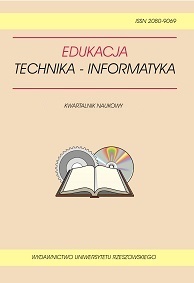Who has better functional-logical capacity: Generation “X”, “Y” or “Z”?
DOI:
https://doi.org/10.15584/eti.2016.2.22Słowa kluczowe:
Generation „X”, „Y”' and „Z”', functional-logical thinking, reform of education, employment, competencesAbstrakt
Functional-logical thoughtful capacities pertain among the essential work competencies when referring to hiring of young people today. Members of this so-called Generation „Z”, born in Serbia, most often characterize individual and non-institutional self-education of information technology, which is „bored” in the traditional school. Researches and results in PISA tests, years back, confirm, that doesn’t have enough developed functional-logical thoughtful capacities, as well as their peers in the countries with a more modern educational-teaching technology. The aim of the paper is to compare the results of the functional-logical testing of members of three generation „X”, „Y” and „Z”. The sample was represented by random respondents matched by their age; gender; educational level or school success. „What had a significant influence on the test results, years (life experience), gender, level of education or school su ccess?” The achieved results are on the side of older and middle generation, which is likely attributable to qualifications, years (life experience) and gender. However, by all criteria, women have shown better results than men. In contrast to that, the weakest results indicate the necessity of school reform, which would implement the content and methods of MENSE – „Nikola Tesla Centre” from the earliest educational age. Modern education must be market-oriented, knowledge-based society that encourages professional, creative and functional-logical mental potential of children. The paradox is that the domestic intelligence is in use in EU countries, but not in Serbia.Pobrania
Opublikowane
2016-06-30
Jak cytować
HILČENKO, S. (2016). Who has better functional-logical capacity: Generation “X”, “Y” or “Z”?. Journal of Education, Technology and Computer Science, 16(2), 169–175. https://doi.org/10.15584/eti.2016.2.22
Numer
Dział
PROBLEMY EDUKACJI INFORMATYCZNO-INFORMACYJNEJ
Licencja
Prawa autorskie (c) 2016 Journal of Education, Technology and Computer Science

Utwór dostępny jest na licencji Creative Commons Uznanie autorstwa – Na tych samych warunkach 4.0 Miedzynarodowe.

